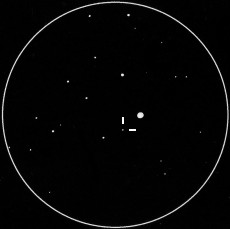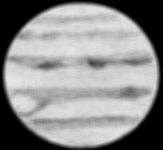Choose your planet :
[Mercure and Venus]
[Mars]
[Asteroids]
[Jupiter]
[Saturn]
[Uranus and Neptune]
Mercure and Venus
Two other "moons" in the sky. Few observable details, but you can follow the phases of these two planets.
Mars
A tiny pink confetti most of the time. During the oppositions we can see a polar cap and some details.
These drawings were made during the opposition of 1988. This opposition offered very favourable conditions : formations like Syrtis Major and Sinus Meridanii were visible in a 60mm refractor...

Mars avec Sinus Meridani
(à gauche)

Mars avec Syrtis Major
(à droite)

Asteroids
On the opposite image, the Hébé asteroid (mag 10, arrow), was drawn by chance in the same field of the galaxy M 100 (the diffuse little glow), and then identified with the "Guide 5" software.
2001/04/22, 60x20R

Laurent Ferrero sketched, below, the motion of asteroids 532 Herculina and 29 Amphitrite, with an Astromaster 70/350 refractor.
Herculina, 9.1m, in Bootes.

2001 March 30 22:30 UT
70/350 refractor, 16x, Aubagne (France, 13)

2001 March 31 à 23:15 UT
70/350 refractor, 16x, Aubagne (France, 13)
Amphitrite, 9.5m, in Virgo.

2001 March 30 22:45 UT
70/350 refractor, 16x, Aubagne (France, 13)

2001 March 31 21:05 UT
70/350 refractor, 16x, Aubagne (France, 13)
Jupiter
Observe the ballet of the four small dots surrounding the planet: the Io, Europe, Ganymède and Callisto satellites. Their motion is very apparent during the occultations.
The surface of Jupiter: try to see the cloudy bands! You can spot two of them easily. The others require more averted vision.
Try to locate the Great Red Spot. It is not very obvious with this aperture but it will enable you to evaluate, thanks to its displacement, the fast rotation of the planet on itself (only 10 hours!).
Here are some Jupiter drawings from 1987.

With a moon's shadow

The Great Red Spot ...

...two hours later
Saturn
You can see the rings, and even, when they are very open, the Cassini division. You can also locate the Titan moon.
![]()
Saturn, 02/07/25 in the morning, by Luciano Pignoloni.
Webcam ToUCam Pro and 60/800 refractor.
Barlow 2x.
Uranus and Neptune
Two "stars", with a small refractor. Do you see the colors ?
The motion of Uranus near Mu Capricornii (the bright star at center, 5,08m).
Sketched by Laurent Ferrero and an astromaster 70/350 refractor (16x). Aubagne, Southern France.

2002 Sept. 15 , 21h30 UT.

2002 Sept. 22, 22h15 UT.

2002 Sept. 30, 21h30 UT.